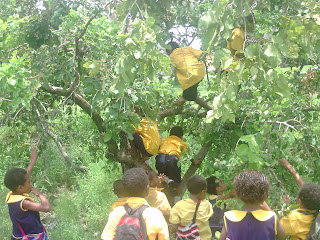A man and his wife, along with their three children, who had spent 13 years building a home at Tubusereia village would see all that dream shattered by a whirlwind in a matter of seconds early this year.
The
exact time and date of that calamity was recorded as 9.00pm, Friday 3rd
February 2012.
It
strikes us as sad yet fascinating that such a mishap should befall a family in
February, a time of year when the planting season is over and when a
subsistence family gets settled down to waiting for the gardens to mature. In a
way, February is a month of rest for most traditional settings and family
units.
But
for a thing like this to happen to a man and his family after 13 years of toil
and sweat leaves us wondering if it is nature that has strayed from us or us
deviating from proper respect and reverence for it.
Haraga
A. Sibona had those thoughts in mind when he visited storyboard last week. He
wanted the story of this Tubusereia family to be shared by other Papua New
Guineans.
The
family in question is Mr Malaga Rei’s, a bese along the Dere shoreline of
Tubusereia.
Mr
Malaga Rei is 57 years old, and with a quietly spoken wife has three children:
two adult males namely Odi and Edea and a teenage daughter.
Mr
Rei currently works as part of the auxiliary staff of the Port Moresby General
Hospital and one can imagine the anxiety that besets most working men his age in
Papua New Guinea, especially upon the verge of retirement. Something must be
done by way of home and security for family before the nominal age catches up.
Hence, the hard work put in by the Rei family over a 13 year period.
But
all that effort would go with the wind, as it were, within seconds.
There
was something mysterious about the formation of the wind that came swooping in
to Tubusereia, mused Haraga Sibona in a passionate mixture of Motu and English
narrative.
“It
was believed to be a whirlwind,” he said, “that was seen just off shore Taurama
Bay, approaching the inner waters of the Bootless Bay and towards the village.
According to the villagers there was an unfamiliar stretch of darkness
conforming with the features of that oncoming imminent storm. In the midst of
this scenario was a faded white image of the whirlwind moving and circling like
a disc as it headed towards the village.”
“The
wind struck the southern end of the village at about 9 o’clock pm,” continued
Haraga Sibona, “blowing down the Rei family house in seconds. The verandah and
roofing parts of four other homes within the Dere and Ikanaia beach and shores
were simultaneously damaged. In the darkness there were sounds of corrugated iron
roofing and timber smashing and ripping apart from the Rei family house. Household
materials and items went crashing in the sea or tossed on the shore banks and the
hillside. Windows, roofing and wall frames were thrown in the air like pieces
of paper over the tops of neighbouring houses. Two power poles were bent, one
damaging the timber walkway leading the Rei family house and the other causing
partial damaged to a house next door. The aftermath the next morning was a
scene of debris littering the beaches of Dere and Ikanaia.”
“Mr
Malaga Rei, known to his folks as a humble man who greets fellow villagers with
a smile, was thoroughly shaken by this tragedy. On that early Saturday morning
he sat in silence on a pile of belongings he has gathered with tears in his
eyes. He felt devastated loosing what he termed as his only valuable family asset.
Otherwise he was at a loss for words to describe his ordeal which was the first
of its kind for him in all his lifetime. His beloved and quiet spoken wife was
speechless but gave a wry smile to those who came by to offer comfort.”
At
this point Haraga Sibona paused as if searching for words, but continued.
“Mr
Rei tried to relay his feelings of how both he and his wife watched their
children grow up without any kind of trouble like this one. They built the
house successfully; they brought PNG Power to it to light it up. And then
tragedy struck. He and his wife were the only ones in the house when that
happened. A regular congregation member of the local church he commends the God
almighty’s protection for him and his wife’s safety. Their two sons, the second
of whom is a father of two children were in the city when the wind struck. Their
only teenage daughter was with the other family next door. That family too was hit
by the wind causing damage to the roofing parts of their house, but they were
all able to escape unhurt.”
As
Haraga Sibona completed this story of the Rei family storyboard asked what was
being done at this time for the family to rebuild. An appeal was launched,
explained Sibona, at the Tubusereia United Church for a general pledge of
donations in cash and kind towards the Rei family in their time of despair. The
Rei boys, Odi and Edea, have already pledged their intention to rebuild at the
same site and are doing what they can to raise the funds. But we hope to spread
this story far and wide for those who might want to share these silent thoughts
with us and help if they can.
Published in
the Post Courier’s Weekend Courier, Saturday 7th April, 2012. Copyright
© 2012 by Haraga A. Sibona.













